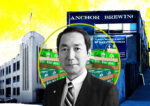Trending
Reffkin to TRD panel: “I believe the traditional brokerage model is not sustainable”
The Compass CEO, along with Corcoran chief Pam Liebman, Elliman head Howard Lorber and others were among those with competing visions for the future

Facing thinning profit margins as commission splits rise and competition from discount brokerages and tech companies heats up — among other factors — national brokerage brands are increasingly expanding just to keep up.
That was the main topic of discussion at The Real Deal South Florida’s Real Estate Showcase & Forum on Thursday, which brought together a panel of of the top leaders in the residential real estate industry.
“I believe the traditional brokerage model is not sustainable,” said Compass CEO Robert Reffkin, a panelist at the event at Mana Wynwood in Miami. He added, “Well before Compass came into place, splits were out of control.” The biggest issue “that no one is talking about,” he added, is the sustainability of the traditional brokerage firm.
But fellow panelist Pam Liebman, Corcoran CEO, quickly countered. As the leader of a so-called traditional brokerage, she asked, “What makes you not a traditional brokerage model?”
Reffkin said the industry is in a “Blockbuster vs. Netflix” moment. “It’s not about what it looks like today, it’s about what it looks like 10 years from now,” he said. “The vision we have in five, 10 years from now is being a single platform.”
Also weighing in on the panel were Douglas Elliman Chairman Howard Lorber, Sotheby’s International Realty Affiliates COO Julie Leonhardt LaTorre, and The Agency CEO and founder Mauricio Umansky.
Panel moderator and TRD senior reporter E.B. Solomont asked about organic growth versus growth through acquisition, which is generally Compass’ M.O.
Lorber said Elliman doesn’t really do many acquisitions, with the exception of Beverly Hills-based Teles Properties.
“All the other acquisitions were smaller companies that just folded into us,” he said. “Most of those companies that came in and joined us, they didn’t have a big market share.”
Umansky, who announced the Beverly Hills-based Agency is opening an office in Boca Raton for its first foray into South Florida, said the brokerage has always focused on growing organically.
“One of the things we do is we do not recruit,” he said. “Everyone who works at the Agency has always reached out and wants to work at the Agency. Not because they’re paid to be there.”
At Compass, Reffkin said the company is moving toward a single platform that lets agents get paid for a slew of services — whether brokering a deal or referring a plumber. “I believe we should be compensated for that,” said Reffkin, whose firm has raised $1.2 billion from investors to date, and has been growing aggressively by recruiting agents and acquiring firms nationwide.
Responding to critics who say Compass is overly aggressive in their pursuit of talent, Reffkin said he’s like a “door knocker agent” who is “happy to pitch myself 10 times.”
“I’m with my agents when you’re calling. Look, it’s Rob again,” Liebman quipped.
Beyond weighing the traditional brokerage model, the panel also addressed the franchise model.
On Wednesday, Corcoran announced it plans to franchise the brand, and expand into markets like Miami.
Lorber said he doesn’t think franchise models work particularly well, to which Liebman joked, “Could you have told me that yesterday?”
Leonhardt LaTorre of Sotheby’s said that if done right, franchises can work. “We did over $1.4 billion in referral business in 2017 that we know of,” she said.
Panelists also addressed unlisted deals, Zillow and data tracking. On Zillow, Liebman was clear about her position: “I feel like they sit around and they just figure out more ways to take money out of the agents.”
Umansky added that brokerages need to start taking control of their inventory — and not have it sold back to the agents. “We have tremendous knowledge and we deliver great service and we protect our clients when they buy and sell real estate,” he said. “We cannot do this business without these agents. The agents are not going away.”




